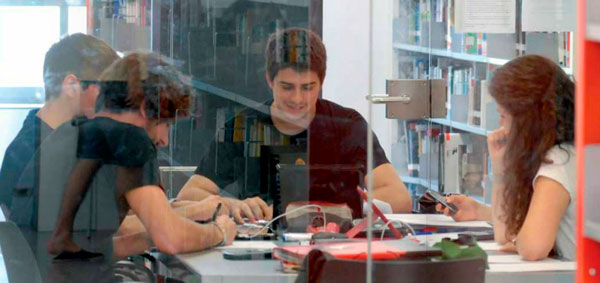A ‘law edition of Trivial Pursuit’ and designing advertising campaigns for third-sector organizations, amongst the teaching innovation projects
A ‘law edition of Trivial Pursuit’ and designing advertising campaigns for third-sector organizations, amongst the teaching innovation projects

Around 80 proposals were submitted to the 2015-2016 call for UPF’s Teaching Quality and Innovation Support Plan (PlaQUID), of which 48 were approved and awarded funding. These figures bear witness to the University’s commitment to advancing the field of teaching innovation and deepening its commitment to society.
Amongst the projects to receive funding, two in particular stand out for their innovative nature and long-term sustainability: ‘TrivialIus’, by the lecturers Lorena Ramírez Ludeña and Alberto Carrio, from the Faculty of Law, and ‘Knowledge transfer to the third sector’, by Beatriz García and Pilar Medina, from the Faculty of Communication.
A ‘law edition of Trivial Pursuit’ to improve learning
TrivialIus is similar to the well-known game of Trivial Pursuit, and it is used as a tool to improve teaching and learning. Working alone, students prepare multiple-choice questions related to the subject syllabus. They then use them to play the trivia game in teams during class.
Funding provided for the project under PlaQUID 2015-2016 was used to develop an application to make playing TrivialIus easy. The application has three modules: an administrative module for managing the game (to set the number of teams, deadlines, number of questions, etc.); a student module for entering new questions and correcting those submitted by classmates; and a teacher module, specifically for playing the game in class. TrivialIus has been used in subjects taught in the Philosophy of Law Area, but it could be used in any other subject, not only in the field of law.
An example of an inclusive flipped-classroom approach, the game has been used since the 2015-2016 academic year in the subject ‘Philosophy of Law’. Both teaching staff and students have shown great interest in its use and have assessed it positively as a tool for promoting class participation. ‘It increases students’ interest and engagement in lectures, makes them more likely to prepare the subject before the exam period, helps them assimilate concepts better, and encourages cooperation and teamwork’, said Ramírez Ludeña, the project manager.
Helping third-sector organizations develop communication campaigns
The ‘Knowledge transfer to the third sector’ project aims to design a subject final project model that is exportable to other programmes and also has a positive impact on society. The projects and additional information are published on the online Acció Audiovisual (Audiovisual Action) platform.
The project (which is being carried out this year too) was launched in the 2015-2016 academic year with a pilot effort conducted in the context of the second-year subject ‘Advertising Communication’ from the bachelor’s programme in Audiovisual Communication. The pilot experience offered signs of the model’s potential success and impact. More than 20 third-sector organizations collaborated on the project, for which the students created (including conception, design, planning and production) some fifty audiovisual pieces. The campaigns, which consisted mostly of commercials and short films, also doubled as the student’s final projects for the subject.
‘The Acció Audiovisual web platform is intended to bridge the gap between the University and the third sector by offering free services to organizations in the sector that could benefit from university students’ projects’, explained García, who is leading the project, which is open to public universities throughout Spain. She added, ‘Furthermore, students become aware of their role in society, come to understand that, before “employees”, they are professionals, and before professionals, people.’ According to García, the students claim to find it more gratifying and also engage more deeply when they work on values as opposed to projects.
Video made by Audiovisual Communication students for the Barcelona Association of Families of Alzheimer Patients
Conference on Teaching Innovation Practices[k2] at the University
These two initiatives, together with most of the projects to receive funding under PlaQuid 2015-2016, were presented on 15 February 2017 at the conference Teaching Innovation Practices at the University, organized by the Center for Learning Innovation and Knowledge (CLIK).
‘TrivialIus’ and ‘Knowledge transfer to the third sector’ were chosen, along with five other projects, to be presented orally (the results of another 37 projects were reported in poster format) within the three different categories of the call: teaching innovation in the classroom, educational quality and cross-disciplinary projects.
The other five projects presented orally were: ‘Collective assessment projects with the new Moodle 2.7 assessment tools and optimization of the organization of internal practices’ (Mar Carrió) and ‘Team UPF at the IGEM competition’ (Jorge García Ojalvo), both linked to the Faculty of Health and Life Sciences; ‘References to strategies used in seminar classes in the humanities and scope, catalogue, analysis and proposals for their implementation’ (Josep M. Castellà, Faculty of Humanities); ‘Use of technology to self-learn academic writing’ (Carmen López Ferrero, Faculty of Translation and Interpreting); and, finally, ‘Assessment for large groups’ (Fernando Guirao, Faculty of Economic and Business Sciences).
The projects approved in the 2016-2017 call for support for teaching and learning quality and innovation (PlaCLIK) are currently being carried out. The 2017-2018 call is pending and expected to be published in April, once it has been approved by the University’s Board of Governors.
